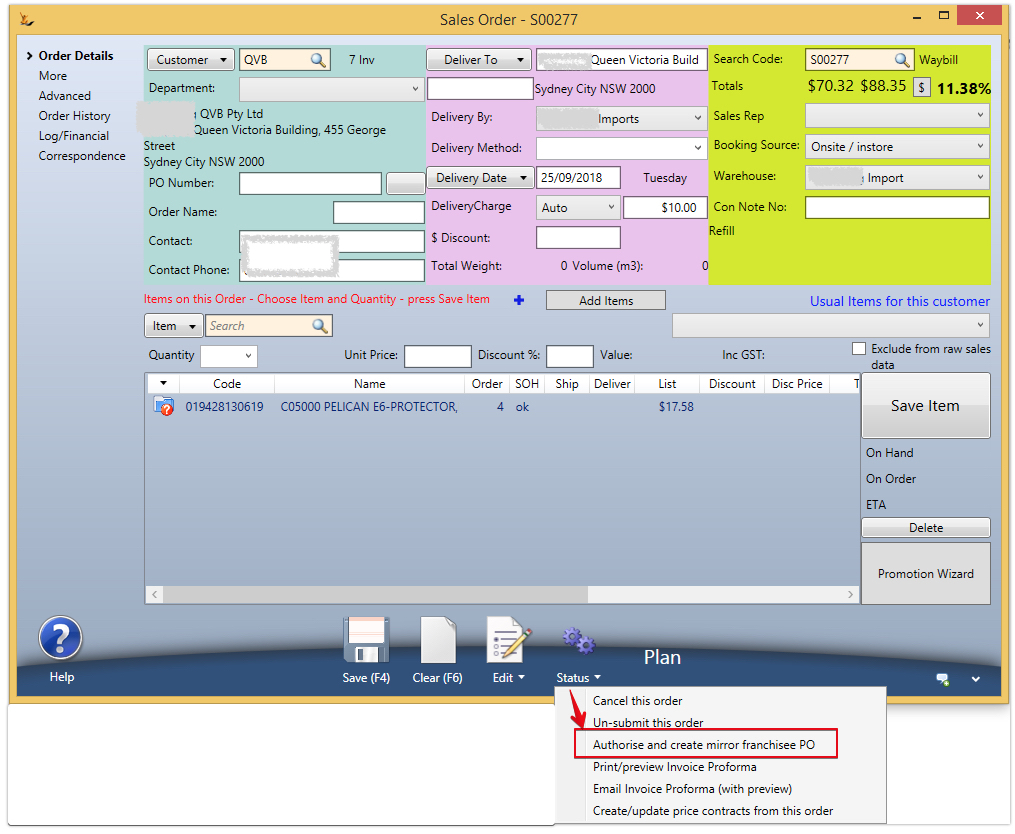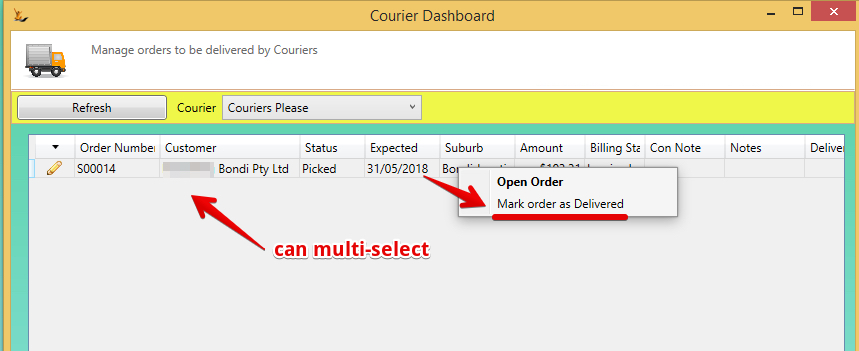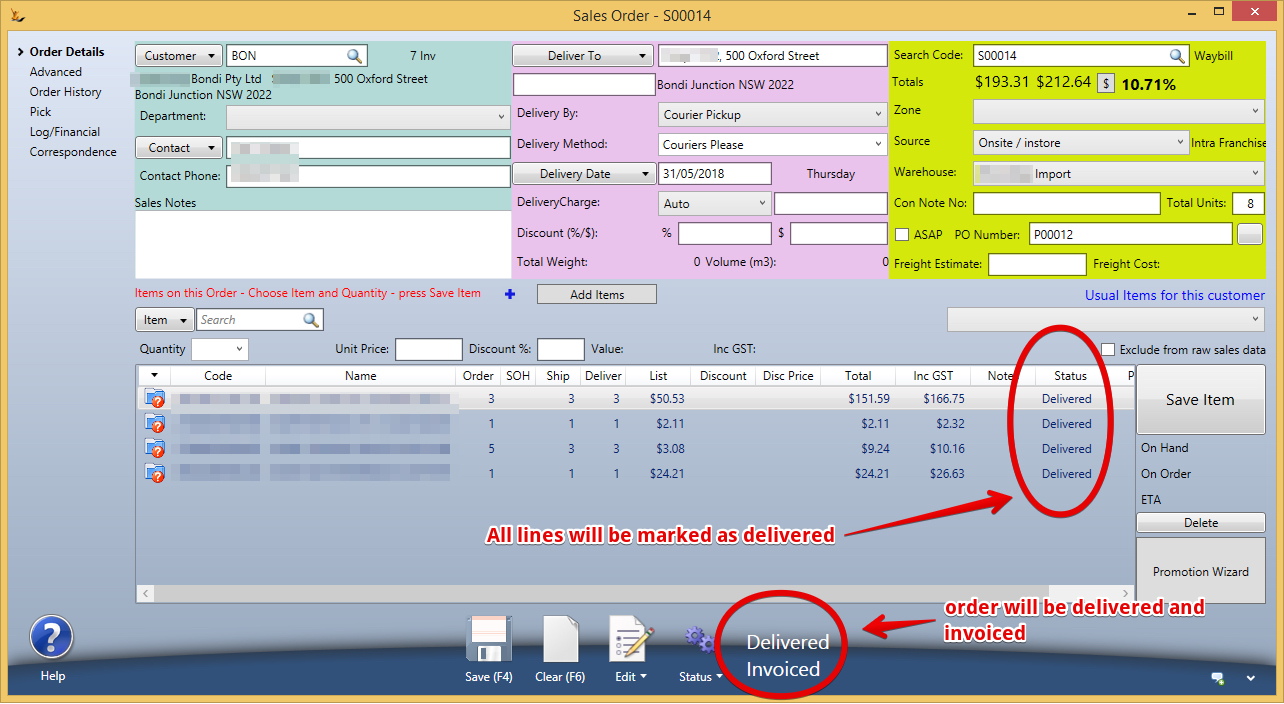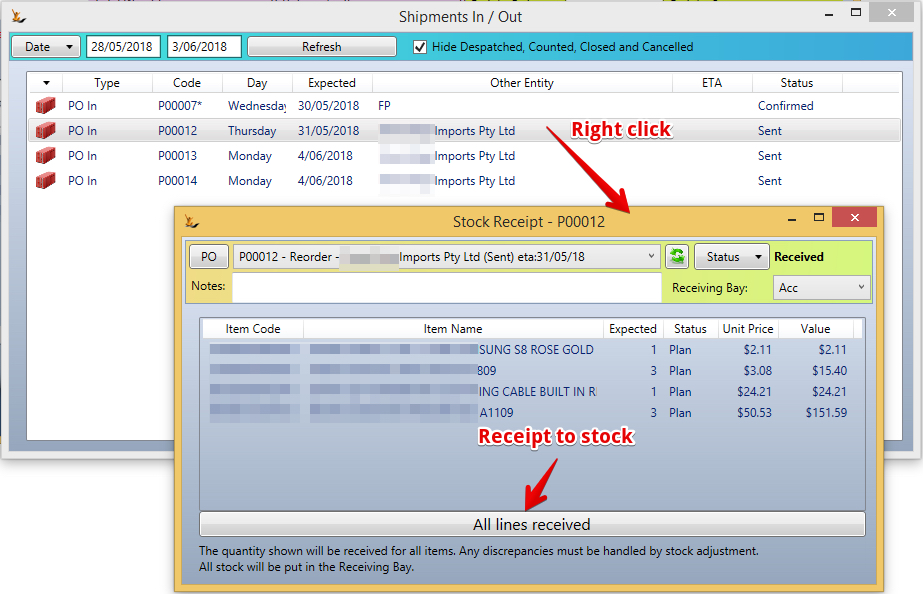See also Retail Store Batches - sending multiple orders in a single batch to a Retail Store for when multiple orders are sent in a single shipment
...
| Note |
|---|
Articles which have a Trigger set will be refilled to target when Stock on Hand is less than or equal to the Trigger. Refill will be in Carton Quantities if the Selling > shipping unit is set to Carton |
Stock from Franchisor Warehouse to Retail Store (single click all stores)
Franchisor
Review and allocate available stock
Using existing stock (
Special Uplifts
Special uplifts can be applied to increase the targets
- Create a playlist and add items to it
- Create a special uplift list in the "Saved Lists"
- Copy from the playlist and set the date effective
Stock from Franchisor Warehouse to Retail Store (single click all stores)
Franchisor
Review and allocate available stock
Using existing stock (or stock expected soon) plan the shipments going today or tomorrow to the retail stores.
...
- Compare requirements with stock on hand
- Ignore unpickable un-pickable locations (pick sequence is -ve)
- Provide visibility of expected stock ETA
- Adjust quantities to manage scarce stock across the stores
 If you make changes in the screen and close the screen the changes are lost. The reason is that the next time you open it the data is likely to be different
If you make changes in the screen and close the screen the changes are lost. The reason is that the next time you open it the data is likely to be different if you do not adjust then sales orders will be > SOH with first picked getting the stock
if you do not adjust then sales orders will be > SOH with first picked getting the stock
- When finished - create all the transactions at once
- Purchase orders in every retail store
- Mirror sales orders in the Franchisor
- Then the sales orders are ready to be picked in the Franchisor
...
- Achieve Target qty for each item (set at store level)
- Special uplift lists can increase target quantity by a %
- PLUS order lines
- Authorised but not picked
- "Waiting" for stock
- PLUS parts in repairs marked "Waiting" for stock
- LESS current stock on hand
- LESS current purchase orders (for this warehouse) > sent not yet counted by the store
- INCREASED to Carton quantity if "shipping unit" is carton (will be indicated in yellow note - eg Carton quantity [50] applied for XXXX)
| Note |
|---|
Articles sourced from multiple suppliers > the default supplier is set to a Phantom supplier. See Parts Price comparisons below. Only shows items if they have a status of Active or Proposed, or a status of Runout and the Warehouse SOH > 0. |
...
of Runout and the Warehouse SOH > 0. Items in Runout status with a replacement item that have a reorder level in a store and no stock in the warehouse > system Copies the runout item reorder level to the replacement item if it has none and clears out the runout item reorder level. Yellow note indicates special information Items with a carton quantity indicated will re-order in carton quantities |
Action = "Create Store Orders" > Creates Purchase Orders in each Retail Store AND Sales Orders in the Franchisor
...
- Note the status is AUTHORISED - ie ready to pick, Line Status is "Plan"
- Note the link to the Franchisee Purchase Order number - PO Status is "Sent", line status is "Plan"
| Note |
|---|
Sales order created in Franchisor to Franchisee will create a mirror PO |
Cancelling the Sales Order deletes the sales order and linked purchase order
Because the purchase order is an intercompany order = cancelling it will delete the order AND the linked purchase order if cancelled before any stock transactions are linked
Pick the sales order
The warehouse in/out dashboard lists all orders that need to be picked
...
Note that the pick sequence is based on the pick sequence setting in the warehouse.
Note that items stored in carton quantities will indicate # cartons to pick and a scan will add a carton quantity
If using Store Batches
| Include Page | ||||
|---|---|---|---|---|
|
If NOT using store batches
| Expand | ||
|---|---|---|
| ||
Update picked quantities - the pick will not be completed until all lines that cannot fulfill stock have a value.
mark as delivered (if via Courier)Enter the CON note on the sale order (enter freight estimate provided if want to compare with later actuals) When the courier picks up a number of sales orders - multi select and mark as delivered The sales order will be marked as delivered and invoicedRetail StoreReceipt purchase order The purchase order will arrive and is ready to be receipted to stock When receipted to stock > Stock is created in the store |
...
Store batches enable sending of a group of sales orders and purchase orders all at one time.
See Retail Store Batches - sending multiple orders in a single batchbatch to a Retail Store - start a store batch and select the purchase order. Any lines that the supplier has sent can be added to a store batch. Any lines the supplier has not yet sent will be able to be added to a later store batch
...
| Expand | ||
|---|---|---|
| ||
The Franchisor opens the PO when it arrives - updates invoice quantity with countsThe Franchisor will be paying the supplier - these quantities will calculate the amount to pay the supplier. Quantity can be greater or less than expected. If less than expected a prompt will ask if more of the short shipped line is expected later and if so will add another line to the purchase order. Can also update the prices per line if different to that expected
Franchisor sends to Retail Store - Marks the Purchase Order as "Shipped" statusWhen finished updating invoice quantity > Save > then move to Shipped status. Retail StoreRetail Store Shipments in/out dashboard - receives and counts the Purchase OrderCount at the store (if want to)As you can see above - the right click provides a number of options
Propose putaway location (where will the stock end up)Can set a single line as going to multiple locations (eg too much for one location). Closing the form and re-opening it clears all proposed putaways. Process all lines in plan statusReceipts the qty on the PO, Creates stock, creates intercompany invoices. |
...
Purchasing to replenish the Franchisor Warehouse via RFQ
If a franchisor - this dashboard plans using the franchisees order history
if not a franchisor - this dashboard uses your sales order history for SKU's ticked "include in RFQ Dashboard"
| Note |
|---|
This dashboard is for stock that moves regularly and does not have expiry dates This When a Franchisor - this does NOT require the Purchase Orders for each store above to have been created. The stock required in the warehouse IGNORES purchase order/ sales order transactions between the Retail Stores and the Warehouse
Franchisor Warehouse Demand uses the sales in each store to calculate overall daily sell rate that the warehouse needs to support
Not a franchisor uses the host company context you are in sales orders. |
Planning
This purchasing planner uses the sell rate of each item to determine how many to purchase to cover a number of days of stock. By default it only shows Items that need action.
- Pick a supplier (only a single supplier may be actioned at a time)
- Enter days back and days forward
- Sell rate (is calculated) = total sales days back / number of days
- Sales = sell rate * days forward
- Enter Part % Overhead. Where a supplier charges in FX then an overhead can be applied
- Show no req: can list all items that have a sell rate regardless if they are required
...
Parts typically can be sourced from multiple places with some OEM and some aftermarket or other quality levels - hence the need to review multiple quotes
...
Definition of a Part
Both of these tests result in a Part
- Buy only > is "Buy Only" Stock Article and generic (can be sourced from multiple suppliers)
- Classification = "Part"
| Note |
|---|
Use this option process when the products can be sourced from multiple suppliers There can only be one parts order at any time saves qty to the database for all items in the list - so can come back and work on the overall order later The version can then Parts Order is intended to be exported as a spreadsheet that is
Sell rate is calculated using the Days Back and days forward based on sales orders found and does not use the stored system sell rate |
Action > Create parts quote spreadsheet
...




















